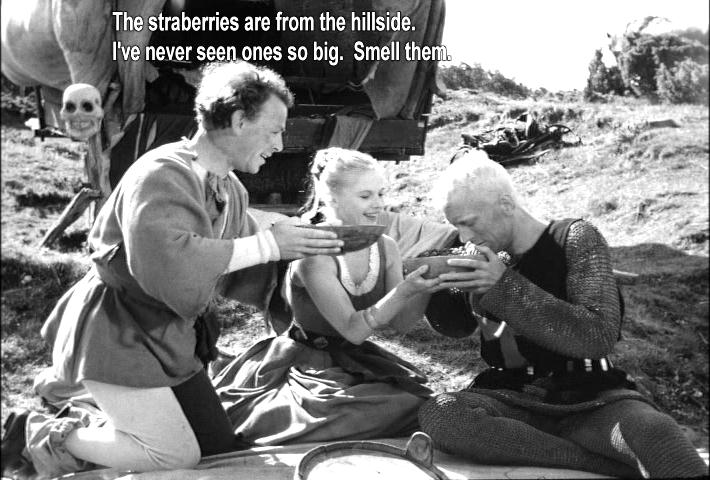"Nothing escapes me. No one escapes me."
-Death
Who hasn't wanted to gamble with Death?
Set in the 12th century, The Seventh Seal (1957) follows a knight on his journey home after the Crusades. Swedish Writer and Director Ingmar Bergman turns his screenplay into the two questions every human will ask themselves- Is death inevitable? Is there a God? This hybrid genre movie will leave you with the answers you may or may not be looking for.
 The black and white movie has a dark mysterious setting that enhances life’s puzzling questions. We at first hear commanding non digetic music and then the subtle sounds of the ocean waves crashing. A perfectly placed chess board is next to the sleeping knight, who is lying on the rocks. Death then shows up as says to the knight, played by Max von Sydow, and says, “I have been at your side a long time.” We learn that Death not only has a face but likes to play games. "We rarely experience the traditions of naturalistic and theatrical mise-en-scene in entirely isolated states",(Corrigan White 88). In this now iconic scene, the knight and Death begin to play a game of chess; in a battle to delay the knight’s death.
The black and white movie has a dark mysterious setting that enhances life’s puzzling questions. We at first hear commanding non digetic music and then the subtle sounds of the ocean waves crashing. A perfectly placed chess board is next to the sleeping knight, who is lying on the rocks. Death then shows up as says to the knight, played by Max von Sydow, and says, “I have been at your side a long time.” We learn that Death not only has a face but likes to play games. "We rarely experience the traditions of naturalistic and theatrical mise-en-scene in entirely isolated states",(Corrigan White 88). In this now iconic scene, the knight and Death begin to play a game of chess; in a battle to delay the knight’s death. The mis-en-scene of this shot is worthy of being recreated, which it has been throughout the years in such films as, Monty Python and the Holy Grail (1975) and Bill & Ted's Bogus Journey (1991). Bergman uses the 180 degree rule here by setting up this scene. On the left we see death covered in a black robe but with a pale white face. Death has selected the black chess piece and says, “It becomes me well.” What got my attention about this shot is how Death is covered in black but the clouds in the sky in the background seem to be allowing the light to shine through. Maybe there is light at the end of the tunnel? Or maybe there is a God looking down on us? On the right side of this medium framed shot, we see the knight in a gloomy light, his features only visible by the shadows of the light from the left. The dimness above him seems to be telling of his inescapable fate, one that cannot be one by a game of chess, no matter how good you are.
Throughout Bergman’s seventeenth movie as a Director, the contrast between black and white is visible in every scene. We follow the knight’s point of view as he travels along his journey home to his wife. He meets a set of friendly actors who are shown in a lighter context as to foretell the audience of their outcome. These characters bring reason to the knight as when he is eating strawberries and says, “I shall remember this moment: the silence, the twilight, the bowl of strawberries, the bowl of milk. Your faces in the evening light. Mikael asleep, Jof with his lyre. I shall try to remember our talk. I shall carry this memory carefully in my hands as if it were a bowl brimful of fresh milk. It will be a sign to me, and a great sufficiency.” This is a defining moment in the film when the audience will learn the answer to the questions.
The Seventh Seal. Directed by Ingmar Bergman. Starring Gunnar Björnstrand, Max von Sydow, Bengt Ekerot. Criterion. 1957. DVD. 1999.
Corrigan & White (2009), The Film Experience: An Introduction.


No comments:
Post a Comment